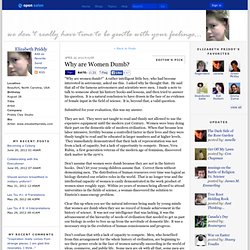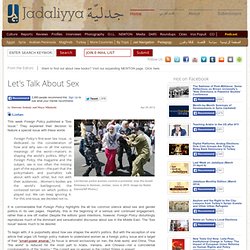

Why are Women Dumb? - Elizabeth Priddy. "Why are women dumb?

" A rather intelligent little boy, who had become interested in astronomy, asked me this. I asked why he thought that. He said that all of the famous astronomers and scientists were men. I made a note to talk to someone about his history books and lessons, and then tried to answer his question. It is a natural conclusion to have drawn in the face of no evidence of female input in the field of science. Submitted for your evaluation, this was my answer. They are not.
Don't assume that women were dumb because they are not in the history books. Clear this up when you see the natural inference being made by young minds that women are dumb when they see no record of female achievement in the history of science. Don't confuse that with a lack of capacity to compete. Fight the war on women. Veil of Ignorance - By Leila Ahmed.
In 1955, Albert Hourani, the Oxford historian and bestselling author of A History of the Arab Peoples, published a short article called "The Vanishing Veil: A Challenge to the Old Order.

" Pointing out that veiling was a fast-disappearing practice in most Arab societies, Hourani gave a brief history of how it was fading from modern society -- and why it would soon become a thing of the past. The trend to unveil, Hourani wrote, had begun in Egypt in the early 20th century, set in motion by the writer Qasim Amin.
Amin had argued that "gradual and careful change in the status of women," including women's casting off their veils, was now an essential step in the advancement of Muslim societies -- and "not contrary to the principles of Islam. " Although Amin's ideas had been met with great resistance, Hourani recounted how they gradually gained acceptance and spread among the "more advanced Arab countries," first in Egypt and then "Syria, Jordan, Lebanon and Iraq. " Karim Sahib/AFP/Getty Images. The Sex Issue. When U.S. magazines devote special issues to sex, they are usually of the celebratory variety (see: Esquire, April 2012 edition; Cosmopolitan, every month).

Suffice it to say that is not what we had in mind with Foreign Policy's first-ever Sex Issue, which is dedicated instead to the consideration of how and why sex -- in all the various meanings of the word -- matters in shaping the world's politics. Why? In Foreign Policy, the magazine and the subject, sex is too often the missing part of the equation -- the part that the policymakers and journalists talk about with each other, but not with their audiences. And what's the result? Women missing from peace talks and parliaments, sexual abuse and exploitation institutionalized and legalized in too many places on the planet, and a U.S. policy that, whether intentionally or not, all too frequently works to shore up the abusers and perpetuate the marginalization of half of humanity.
Why Do They Hate Us? Let's Talk About Sex. This week Foreign Policy published a “Sex Issue.”

They explained their decision to feature a special issue with these words. Debating the War on Women - An FP Roundtable. Sondos Asem: Misogyny exists, but blaming it for women's suffering is simplistic Shadi Hamid: Arab women have more agency than you might think Imam Feisal Abdul Rauf: The Prophet Mohammad was a revolutionary feminist Hanin Ghaddar: We need more badass ladies Naheed Mustafa: "Nekkid Burqa Woman" is lazy and insulting Leila Ahmed: Eltahawy misreads Alifa Rifaat Sondos Asem: When I marched to Tahrir Square on Jan. 25, 2011, I was driven by the indignities and suffering endured by all Egyptians, men and women, from decades of corrupt and oppressive rule.

Although I share many of her concerns, I respectfully disagree with Mona Eltahawy's simplistic assertion that the plight of women in the Arab world is the result of being hated by the rest of society -- more specifically, by men, and even more so by newly elected Islamists. Indeed, the status of women is a serious challenge in post-revolutionary Egypt.
But how do we move forward? Shadi Hamid: There are no shortcuts. Imam Feisal Abdul Rauf: